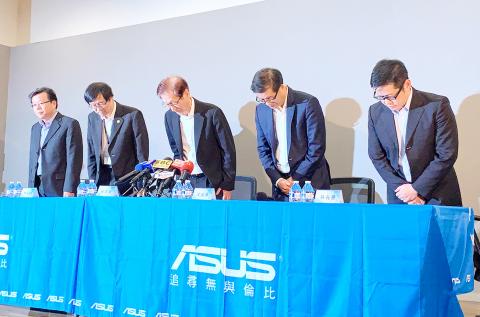Citing waning sales and intensifying competition over the past few years, Asustek Computer Inc (華碩) chief executive officer Jerry Shen (沈振來) yesterday tendered his resignation to make way for a new leadership structure consisting of two CEOs, S.Y. Hsu (許先越) and Samsun Hu (胡書賓), who formerly served as vice presidents at the company.
The company’s board of directors has approved the leadership shake-up, which is to take effect on Jan. 1.
Shen is to lead iFast (創捷前瞻), a new artificial intelligence and Internet of Things start-up focusing on finding new applications for products ranging from smartphones to smart home appliances.

Photo: CNA
Asustek chairman Jonney Shih (施崇棠) is to remain in his position.
The arrangement is aimed at overhauling the culture at Asustek, Shen said, adding that he would have much more room to innovate at the helm of a small start-up.
Asustek said it plans to take a 30 percent stake in iFast, investing up to NT$10 billion (US$324.15 million), and hopes to become a notable player in the field in three year’s time.
The company also announced a major overhaul of its smartphone business to focus on gamers and power users, following a decline from its heyday when it found success in products such as Eee PC laptops, the Nexus 7 tablet and Zenbook laptops.
However, the restructuring would result in a one-time loss of NT$6.2 billion to account for loss of inventory, royalties, production costs and organizational adjustment expenses, it said.
While the expense would push this quarter’s results into the red, the company would remain profitable this year and be able to meet its cash dividend, Asustek chief financial officer Nick Wu (吳長榮) told a news conference.
“We are going back to our roots as a premium brand and are moving to a higher price tier,” Shih said.
Shih said that the company’s focus is on creating compelling products with excellent quality, and that one of its first steps is to build on the warm reception of its ROG gaming smartphone, and leverage its Republic of Gamers brand and gaming solutions.
“We are aiming to match the Apple iPhone and Google Pixel in terms of user experience,” Shih said, adding that the high prices of those models have not helped their sales, as the global smartphone market is becoming increasingly saturated.
Consumers should begin to see the company’s revamped product lineup around the middle of next year, Shih said.

SEMICONDUCTORS: The German laser and plasma generator company will expand its local services as its specialized offerings support Taiwan’s semiconductor industries Trumpf SE + Co KG, a global leader in supplying laser technology and plasma generators used in chip production, is expanding its investments in Taiwan in an effort to deeply integrate into the global semiconductor supply chain in the pursuit of growth. The company, headquartered in Ditzingen, Germany, has invested significantly in a newly inaugurated regional technical center for plasma generators in Taoyuan, its latest expansion in Taiwan after being engaged in various industries for more than 25 years. The center, the first of its kind Trumpf built outside Germany, aims to serve customers from Taiwan, Japan, Southeast Asia and South Korea,

Gasoline and diesel prices at domestic fuel stations are to fall NT$0.2 per liter this week, down for a second consecutive week, CPC Corp, Taiwan (台灣中油) and Formosa Petrochemical Corp (台塑石化) announced yesterday. Effective today, gasoline prices at CPC and Formosa stations are to drop to NT$26.4, NT$27.9 and NT$29.9 per liter for 92, 95 and 98-octane unleaded gasoline respectively, the companies said in separate statements. The price of premium diesel is to fall to NT$24.8 per liter at CPC stations and NT$24.6 at Formosa pumps, they said. The price adjustments came even as international crude oil prices rose last week, as traders

Taiwan Semiconductor Manufacturing Co (TSMC, 台積電), which supplies advanced chips to Nvidia Corp and Apple Inc, yesterday reported NT$1.046 trillion (US$33.1 billion) in revenue for last quarter, driven by constantly strong demand for artificial intelligence (AI) chips, falling in the upper end of its forecast. Based on TSMC’s financial guidance, revenue would expand about 22 percent sequentially to the range from US$32.2 billion to US$33.4 billion during the final quarter of 2024, it told investors in October last year. Last year in total, revenue jumped 31.61 percent to NT$3.81 trillion, compared with NT$2.89 trillion generated in the year before, according to

SIZE MATTERS: TSMC started phasing out 8-inch wafer production last year, while Samsung is more aggressively retiring 8-inch capacity, TrendForce said Chipmakers are expected to raise prices of 8-inch wafers by up to 20 percent this year on concern over supply constraints as major contract chipmakers Taiwan Semiconductor Manufacturing Co (TSMC, 台積電) and Samsung Electronics Co gradually retire less advanced wafer capacity, TrendForce Corp (集邦科技) said yesterday. It is the first significant across-the-board price hike since a global semiconductor correction in 2023, the Taipei-based market researcher said in a report. Global 8-inch wafer capacity slid 0.3 percent year-on-year last year, although 8-inch wafer prices still hovered at relatively stable levels throughout the year, TrendForce said. The downward trend is expected to continue this year,